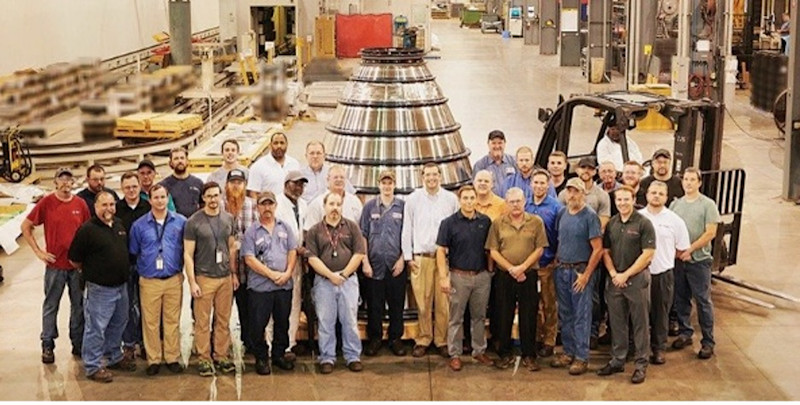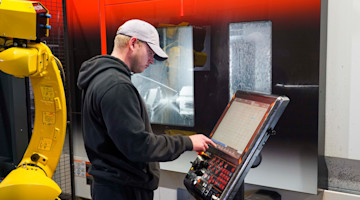The Artemis spaceflight program will return the United States to the Moon more than 50 years after the first Moon landing. Directed predominantly by NASA, and with the participation of U.S. commercial spaceflight companies contracted by NASA as well as many international partners, the program will send crew to the lunar south pole region. The launch vehicle, or Space Launch System (SLS), is a heavy-lift expendable rocket that has been under development since its announcement in 2011. It will launch Artemis I, II, and III. Commercial launch vehicles are planned for use to launch various other elements of the program.
The SLS will include the Orion spacecraft, which is the exploration vehicle that will carry the crew to space, provide emergency abort capability, sustain the crew during space travel, and provide safe reentry to earth. The Orion spacecraft will hold four astronauts and will be able to remain docked to the space station for up to six months.
Major Tool & Machine (MTM), headquartered in Indianapolis on a sprawling 620,000 square-foot campus, has been involved in the Artemis program since 2011. Celebrating their 75th anniversary in 2021, MTM specializes in large CNC milling and turning machining, high-speed machining, manual and robotic welding, engineering, CAD/CAM programming, project management, inspection, and assembly services.
MTM has manufactured several components of the SLS and Orion spacecraft, including cone panels for Orion; RS-25 rocket engine nozzles capable of 512,000 pounds of thrust; large diameter rings for the Launch Vehicle Stage Adapter (LVSA); and tank-related components for the Core Stage. Since starting work on these projects in 2011, the company has expanded its manufacturing capabilities and developed core competencies critical to being a key supplier to the Artemis program. It has made investments in additional machining centers and engineering, quality assurance, and skilled labor personnel.
“The Artemis program is about advancing human space exploration and being a part of something larger than ourselves,” said David Weyreter, Vice President, Sales & Marketing, MTM. “On behalf of the entire Major Tool family, we are honored to have the opportunity to support NASA and its prime contractors in sending humans back to the Moon and then to Mars. It has not only given us the ability to grow our highly skilled team in downtown Indianapolis but, more importantly, the opportunity to actively contribute to our country and advance American manufacturing, technology, and innovation.”
NASA’s prime contractors on the Artemis project are Aerojet Rocketdyne, Boeing, Jacobs, Lockheed Martin, and Northrop Grumman; however, these companies do only about one-third of the work in-house. The rest – the majority – is subcontracted to more than 3,800 suppliers nationwide. Many of these are small to medium-sized manufacturers with niche capabilities.
Lockheed Martin has completed assembly and testing of the Orion Artemis I spacecraft and has transferred possession to NASA's Exploration Ground Systems (EGS) team, which will perform final preparations on the spacecraft for its mission to the Moon later this year. The Artemis I mission will be the first launch of the Orion spacecraft aboard NASA's Space Launch System rocket. Over the course of three weeks, the uncrewed Orion capsule will fly out and orbit the Moon and return to Earth. This test mission will validate the spacecraft, rocket, and ground systems for future crewed missions.
Apollo vs. Orion
The Apollo spacecraft was designed to go only to the Moon. Orion has been designed to go to the Moon, past the Moon, and reach an orbit farther away than any human spacecraft has ever traveled. Compared to the Apollo spacecraft, Orion has superior radiation protection, the world’s largest heat shield, and redundant systems, such as computers that remain operable in case something goes wrong. Orion is a critical part of NASA’s Artemis program to build a sustainable presence on the lunar surface and to prepare humans to one day travel to Mars.






